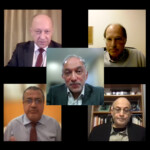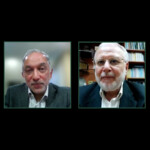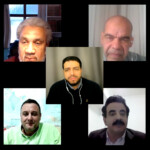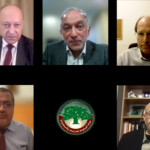Al-Zaytouna Centre for Studies and Consultations held, on 15/11/2022, a panel discussion entitled “Multipolarity and the Shifting Alliances in the Middles East” with the participation of a group of heads of think tanks, researchers and experts specialized in international relations, from Turkey, Malaysia, Russia, China, the United States, France, Poland, Britain, South Africa and a number of Arab countries.
Al-Zaytouna General Manager Prof. Dr. Mohsen Mohammad Saleh made his opening remarks, stating that the objective of this panel discussion is to assess the current international developments and changes and their impact on the alliances in the Middle East. It is held at a time where the Middle East is going through critical and complicated conditions.
The moderator Na’eem Jeenah, the executive director of the Afro-Middle East Centre (AMEC)-South Africa, introduced the first speaker Dr. Andrey Kortunov, the general director of the Russian International Affairs Council (RIAC)-Russia. Kortunov discussed the changes and balances between international powers, and their impact on the regional powers. He said that he is “very skeptical about whether we move to what can be called a traditional or classical multipolarity,” adding that “only one country, namely the United States of America has all the components of power and can be qualified as super power,” whereas China has an economic power but it is much weaker than the United States. The European Union has profound soft power and economic power but it has very limited hard power. As for Russia, it has strong military capabilities, and the ability to build a network of political, economic and military relations in the region.
As for the Middle East, Kortunov saw that it “should emerge as a single pole.” It should consolidate major countries to come up with joint foreign policy priorities, which is not happening right now. He said that “the current situation creates new opportunities for mid-size countries.” He concluded that there are three options or scenarios along which the region might evolve in terms of security:
First: The region “would continue to rely on an external hegemonic power and namely the United States,” and that would mean that the US security guarantees should be credible. But Kortunov considered that many in the region question the credibility of such guarantees because the relative importance of the region for the US is going down.
Second: Relying on domestic hegemonic power, where there would be local security system. However, Kortunov considered it not very likely, for there are many disagreements.
Third: The countries of the region would have some outside assistance, and can work on specific incremental small-scale technical security issues, like for instance maritime security, confidence building measures…And this Kortunov considered a realistic scenario.
The second main panelist was Dr. Louis Blin, director of Middle East Directions Research Program of the Robert Schuman Centre, European University Institute (EUI) in Florence, Italy. He said that Russia has become a major enemy for the European public opinion, and the marginalization of the Middle East and particularly the Palestinians’, has increased. However, he considered it premature to know if this marginalization is positive for the Arab in general and the Palestinians in particular. Blin saw that the Middle East has “lost it centrality in international geopolitics and thus has lost most of its importance to the West.” Thus, he recommended that people of the Middle East should learn from the consequences of this new order and they shouldn’t wait for an external solution for their problems.
Blin saw that China has become the major competitor to the United States, despite their current focus on Russia. He stressed that the Russian military failure in the ongoing war in Ukraine has led to a decline in Russia’s standing in the Arab countries, which was counting on Russian military support. As for Europe, he saw that it is the side that lost the most due to the war in Ukraine, and that it needs other sources to provide it with energy.
The third speaker was Dr. Ibrahim Fraihat, the associate professor in international conflict resolution at Doha Institute for Graduate Studies, Qatar. He considered that there is liquidity in the regional order and that the final map did not crystalize yet, waiting for what will happen to some developments and transformations in the global system, particularly in the political map of the superpowers, mainly the United States (presidential elections 2024). Fraihat pointed out that the United States created a vacuum in the region after its role declined, thus providing some countries with some margin to move and fill that void. This was manifested in the Russian-Turkish coordination in managing and settling some files related to the war in Syria, the Libyan file, and the war between Azerbaijan and Armenia.
Fraihat stressed that China and Russia do not want to play the policeman role in the region as an alternative to the previously played US role. Some regional parties may play some roles in certain files and places, but not in a broad manner.
The fourth speaker was Prof. Dr. Sami al-Arian, director of Center for Islam and Global Affairs (CIGA) at Istanbul Zaim University, Turkey. Al-Arian said that the grand strategy that the United States has pursued since the collapse of the Soviet Union in 1991 did not change in any significant or meaningful way. He added that until Trump took over in 2017, the US pursued the strategy of liberal hegemony, which afforded the US to try all sorts of things including trying to invade the Middle East, and that experiment was a colossal failure, however, it did not have to pay any price by being the unipolar in the world.
He explained that the US is very much concerned about China’s soaring economic rise during the past twenty years, because that economic power could easily translate into military one, and therefore it could challenge the US, not just in its own region but also globally.
Al-Arian added that the US has kept the dollar currency as the reserve currency of the world, where the dollar is about 62-64% of it. It has confronted the Russian move in Europe and the Chinese move in the Pacific region, and this means that the rise of any pole in the future will not be easy.
With regard to the Middle East, al-Arian said that it is difficult to form alliances with the US administration while ignoring a solution to the Palestine issue, and ignoring the popular movement against authoritarian regimes. He pointed out that China is not effective when dealing with the Palestine issue, despite its support of Palestinian rights. He considered that through the Abraham Accords there are attempts to reshape the system by which Israel becomes the regional hegemon in the world under the tutelage of the US. He stressed that the US, Russia and China are the major players in the Middle East, and that the dominance of the counter-revolutionary forces will not be permanent and in some ten years things would be different.
During the session, there were important interventions and questions from a number of experts and specialists, and it was concluded by the answers and clarifications of the main panelists.
Al-Zaytouna Centre for Studies and Consultations, 17/3/2022








Leave A Comment